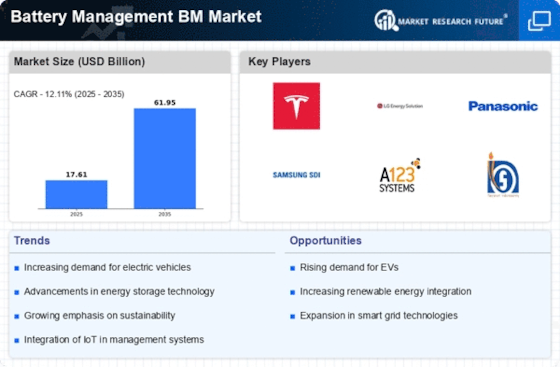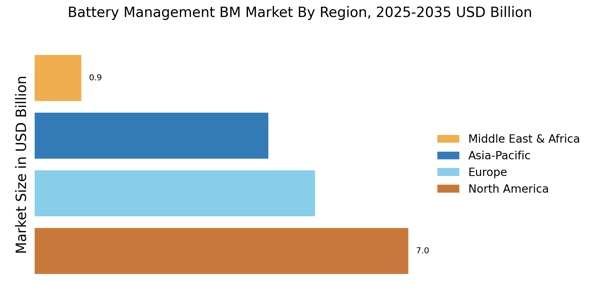Growing Consumer Electronics Market
The burgeoning consumer electronics market is a significant driver for the Battery Management Market BM Market. With the proliferation of smart devices, wearables, and portable electronics, the demand for efficient battery management systems has escalated. In 2025, the consumer electronics sector is anticipated to reach a market value of over 1 trillion USD, necessitating advanced battery management solutions to ensure optimal performance and user satisfaction. As manufacturers strive to enhance battery life and reduce charging times, the Battery Management Market BM Market is likely to see increased investments in innovative management technologies that cater to the evolving needs of consumers.
Rising Demand for Electric Vehicles
The increasing adoption of electric vehicles (EVs) is a primary driver for the Battery Management Market BM Market. As consumers and manufacturers prioritize sustainability, the demand for efficient battery management systems has surged. In 2025, the number of electric vehicles on the road is projected to exceed 30 million, necessitating advanced battery management solutions to optimize performance and longevity. This trend indicates a robust growth trajectory for the Battery Management Market BM Market, as automakers seek to enhance battery efficiency and reduce charging times. Furthermore, the integration of sophisticated battery management systems is essential for meeting regulatory standards and consumer expectations, thereby propelling market expansion.
Regulatory Compliance and Safety Standards
Regulatory compliance and safety standards are increasingly shaping the Battery Management Market BM Market. Governments and regulatory bodies are implementing stringent guidelines to ensure the safety and reliability of battery systems, particularly in automotive and industrial applications. In 2025, the emphasis on safety is expected to drive the adoption of advanced battery management systems that can monitor and manage battery health effectively. This regulatory landscape suggests that companies operating within the Battery Management Market BM Market must prioritize compliance to remain competitive and mitigate risks associated with battery failures. As a result, the market is likely to witness a surge in demand for solutions that not only meet regulatory requirements but also enhance overall battery performance.
Increased Focus on Renewable Energy Sources
The global shift towards renewable energy sources, such as solar and wind, is driving the demand for efficient energy storage solutions, thereby impacting the Battery Management Market BM Market. As more countries commit to reducing carbon emissions, the integration of battery management systems in renewable energy applications becomes crucial. In 2025, the energy storage market is projected to grow to over 20 billion USD, with battery management systems playing a vital role in optimizing energy storage and distribution. This trend suggests that the Battery Management Market BM Market will benefit from the increasing need for reliable and efficient energy storage solutions that can support the transition to a more sustainable energy landscape.
Technological Advancements in Battery Technologies
Technological innovations in battery technologies, such as lithium-ion and solid-state batteries, are significantly influencing the Battery Management Market BM Market. These advancements enhance energy density, charging speed, and overall battery life, which are critical for various applications, including consumer electronics and renewable energy storage. In 2025, the market for lithium-ion batteries is expected to reach approximately 100 billion USD, highlighting the importance of effective battery management systems in maximizing these technologies' potential. As manufacturers continue to invest in research and development, the Battery Management Market BM Market is likely to experience substantial growth driven by the need for sophisticated management solutions that can adapt to evolving battery technologies.

















